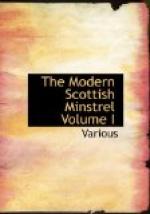In 1768, along with his wife and daughter, Mr Macvicar returned to Scotland, his health having suffered by his residence in America; and, during the three following summers, his daughter found means of gratifying her love of song, on the banks of the Cart, near Glasgow. The family residence was now removed to Fort-Augustus, where Mr Macvicar had received the appointment of barrack-master. The chaplain of the fort was the Rev. James Grant, a young clergyman, related to several of the more respectable families in the district, who was afterwards appointed minister of the parish of Laggan, in Inverness-shire. At Fort-Augustus, he had recommended himself to the affections of Miss Macvicar, by his elegant tastes and accomplished manners, and he now became the successful suitor for her hand. They were married in 1779, and Mrs Grant, to approve herself a useful helpmate to her husband, began assiduously to acquaint herself with the manners and habits of the humbler classes of the people. The inquiries instituted at this period were turned to an account more extensive than originally contemplated. Mr Grant, who was constitutionally delicate, died in 1801, leaving his widow and eight surviving children without any means of support, his worldly circumstances being considerably embarrassed.
On a small farm which she had rented, in the vicinity of her late husband’s parish, Mrs Grant resided immediately subsequent to his decease; but the profits of the lease were evidently inadequate for the comfortable maintenance of the family. Among the circle of her friends she was known as a writer of verses; in her ninth year, she had essayed an imitation of Milton; and she had written poetry, or at least verses, on the banks of the Cart and at Fort-Augustus. To aid in supporting her family, she was strongly advised to collect her pieces into a volume; and, to encourage her in acting upon this recommendation, no fewer than three thousand subscribers were procured for the work




